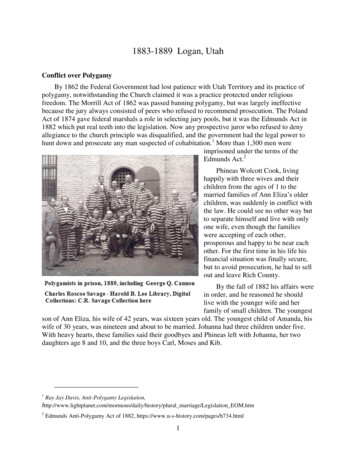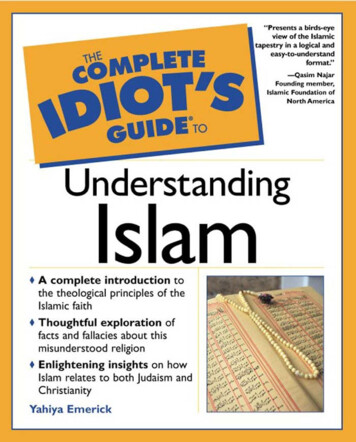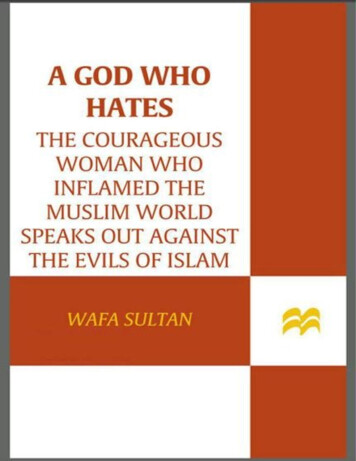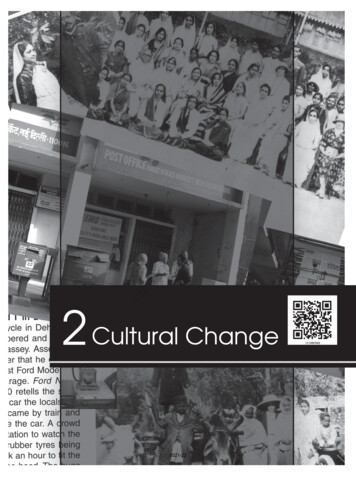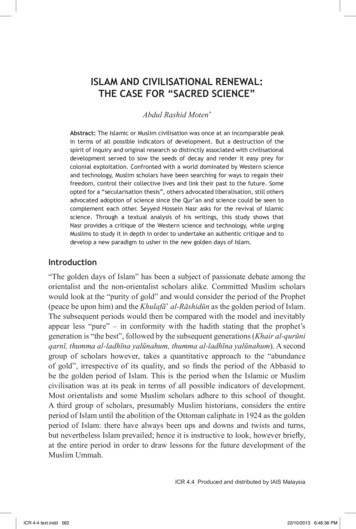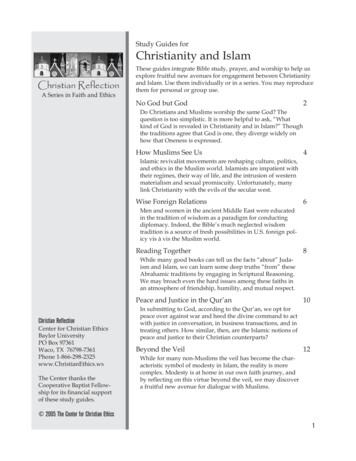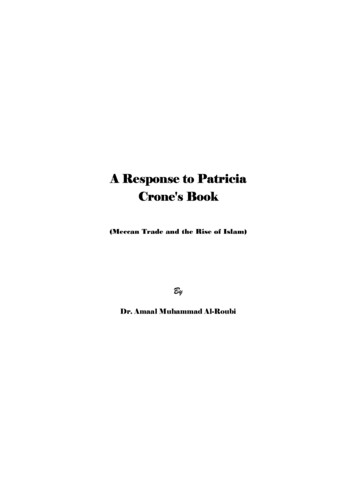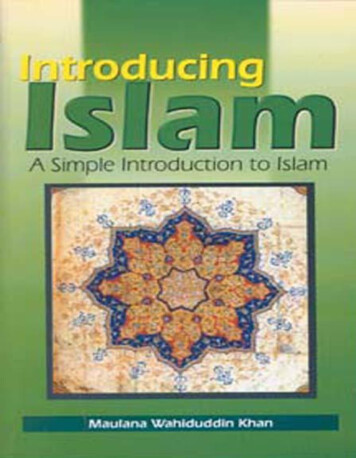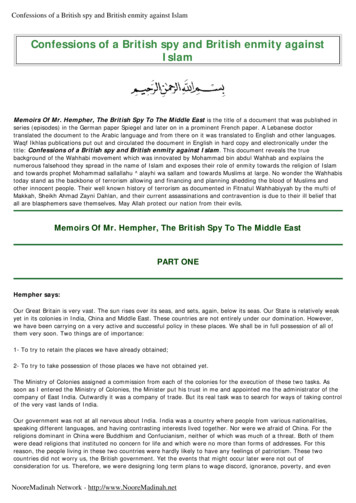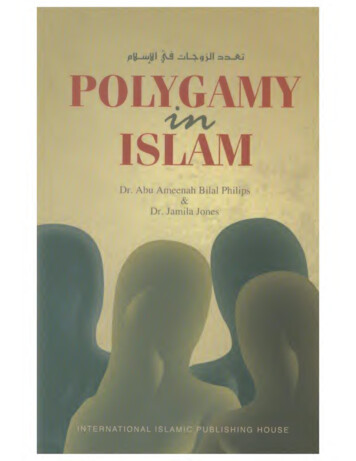
Transcription
POLYGAMYISLAMDr. Abu Ameenah Bilal Philips&Dr. Jamila Jones
POLYGAMYINISLAMDr. Abu Ameenah Bilal PhilipsandJameelah JonesINTERNATIONAL ISLAMIC PUBLISHING HOUSE
International Islamic Publishing House, 2005King Fahd National Library Cataloging-in-Publication DataPhilips, Abu Ameenah Bilal and Jones, JameelahPolygamy in Islam. / Abu Ameenah Bilal Philips and JameelahJones ; 2nd ed., - Riyadh , 2005.p ; 22 cmISBN: 9960-9533-0-01 - Polygamy254.1 dcI - Title1425/1994Legal deposit no. 1425/1994ISBN: 9960-9533-0-0All rights reserved. No part of this book may be reproduced ortransmitted in any form or by any means, electronic ormechanical, including photocopying, recording, or by anyinformation storage and retrieval system, without writtenpermission from the Publisher.International Islamic Publishing House (IIPH)P.O.Box 55195 Riyadh 1 1 534, Saudi ArabiaTel: 966 1 4650818 - 4647213 - Fax: 4633489E-Mail: iiph@iiph.com.sa — www.iiph.com.sa
CONTENTSPublishers Note07Preface: Third Edition09Preface: First Edition11Section OneInstitutional Monogamy13Early Christians were polygynous14Self-denial as a way of life15Monogamy protects males18Section TwoMarriage in Islam21Marriage superior to transient relationships22Rights of marriage partners23The greater responsibility of males30A wife’s duties32Obedience to husbands36Muslim women not like non-believing women41Section ThreeTa ‘ad-dud: Polygyny43Legality of polygyny44Women outnumber men48Male sex-drive and the veil48
6ContentsConditions for plural marriages55Section FourDivision in Pl ural Marriages59The principle of equality62Beginning division63Time division65A wife’s right to time67Time rights oT a new wife70Conjugal rights72Making up time74Giving up division rights78Residence riglhts79Travel rights81Spending and clothing rights83Gifts84Section FiveConclusion87Bibliography97Glossary99Directory of Symbols101Transliteration Chart102Index of Hadiths104
PUBLISHER'S NOTEAllah alone, the All-Merciful, deserves all praise andthanks, Lord of the universe, its Creator and Sustained Blessingsand peace be upon the last of the prophets and messengers,Muhammad, his family and Companions and all those whofollow in his footsteps till the end of time.Polygamy in Islam is a favourite topic for the critics ofIslam and its message. The so-called secular and Western globaldomination has maligned the subject to the extent that itsimpact is felt worldwide. Some so called ‘modem’ Muslimscholarshavesuccumbedtothepropaganda.Theymis interpreted the Qur’an to prove that monogamy, as preached bythe West, is the only ideal concept and practice and that theQur’an condones it.This book is the outcome of thorough studies of sisterJameelah Jones and brother Abu Ameenah Bilal Philips. Both ofwhom reverted to Islam in 1971 and 1972 respectively. Theirwestern background facilitated a deep understanding of thesubject. They have dealt with it strictly in the light of the Qur’anand Sunnah and have described the important characteristics ofmarriage in Islam. They have provided a straightforward reply tothe question of why Islam allows four wives.The book has been well received by the readership and iskey in dispelling the malignant propaganda. This is the fourth
8Publisher s Notethoroughly revised edition with a number of improvements. Weare happy to present it in the best possible way with the hope andprayer that Allah will make it much more beneficial to our readers.Muhammad ibn ‘Abdul-Muhsin al-TuwaijriGeneral Manager,International Islamic Publishing House, IIPHRiyadh, Saudi Arabia
PREFACE: THIRD EDITIONOince its publication in 1985, this work continues to be oneof the only books of its kind in English devoted solely to thehighly controversial topic of polygamy in Islam. As such, thesteadily increasing demand for copies among both Muslims andnon-Muslims has necessitated the undertaking of a third reprint.However, rather than merely reprinting the original, we decided toimprove each reprint for the readers’ benefit.The minor changes of the second edition have alimprovements. All Hadiths [statements of the Prophet ( )]have been carefully authenticated. The few unreliable (Da‘If)traditions remaining in the text have been identified as such in thefootnotes and will — God willing — be removed from the book insubsequent editions. The hadiths have also been thoroughlyreferenced to existing English translations of the hadith classicswith the help of brother Iftekhar Mackeen. Thus, the Englishreader may now more easily engage in further research on thetopic from English reference works. An index of hadithsmentioned in the text has also been added in order to facilitatelater use of the text. Beside these additions, there have also beensome cosmetic changes to both the text and the cover design in anattempt to make the book more visually attractive. As to the title, ithas been changed from “Plural Marriage in Islam” to “Polygamyin Islam” based on the recommendations of some readers whosuggested that the subject matter of the book would be more
/0Preface: Third Editionobvious at a glance using the well-known tenn “polygamy”.It is hoped that these improvements and changes will beappreciated by the readers and that the educational goals of thebook be achieved in its further and wider distribution.Lastly, it is our prayer that Almighty God, Allah (-%;), addthese humble efforts to clarify the message of Islam to our scale ofgood deeds on the Day of Recompense.Abu Ameenah Bilal Philips
PREFACE: FIRST EDITIONLet it be known that we are not suggesting that polygamybe the lifestyle for every Muslim, nor should anyone enter apolygamous relationship anticipating a bed of roses. Polygamy isa complicated aspect of marriage in Islam in which the welfare ofthe community supercedes the desires of the individual (woman).Nowadays, polygamy is usually viewed as a right that man has butshould not take, or as a law that is outmoded and in need of beingabolished. Muslims often attempt to hide it or apologize for itsexistence. There is no need to hide or apologize but there is needfor those who have decided to adopt it as a lifestyle to try andhandle it in the best possible way, the way of the ProphetMuhammad ( g), and for those who are ignorant of its rationaleand laws to become acquainted with them.This book contains basic guidelines for anyone interested inunderstanding the rights and obligations of males and females inIslamic plural marriages. The guidelines have been drawn fromthe Qur’an, Hadith, the sayings and actions of the ProphetMuhammad ( &) and the opinions of Islamic scholars. It is hopedthat the material will be as beneficial to all who read it as it was tous in compiling it.Jameelah JonesTaif, Saudi Arabia
12
Section OneINSTITUTIONAL MONOGAMYThis material was not put together in defense of polygyny1(Ta ‘addud az-Zawjat), for Allah has already confirmed the right todo so as clearly stated in the Qur’an:Tr if ''' f sfM: 0 } T/ (r". Marry of the women that please you; two, three orfour, but ifyou fear that you will not be able to dealjustly, then only one.”(Qur’an 4: 3)Moreover, the Prophet ( g) demonstrated in detail howpolygyny should be put into practice in his divinely guided life style (Sunnah). Ta addud (polygyny) was the practice of most oithe major Sahabah (Companions of the Prophet — may Allah bepleased with them all) as well as many outstanding scholars of theMuslim Ummah (nation) from the earliest time of Islam up untiltoday. Ta ‘addud was also practised among a portion of the general1 Webster’s New World Dictionary defines polygyny as a practice of havingtwo or more wives at the same time; whereas, polygamy is defined as thepractice of having two or more wives or husbands at the same time.
14Institutional Monogamymasses in most Muslim countries before and after the advent ofEuropean colonization. In fact, it is only in recent times (earlytwentieth century) that a loud new cry has been raised by so-calledmodernist Muslims attacking the institution of marriage in Islamdue to its recognition of polygyny and the ease with which divorcemay be obtained. They propose the replacement of the Islamicform of marriage with the restrictive impractical monogamypracticed in the West, arguing that it is the only just and civilizedform of marriage. As a result, a number of countries with Muslimmajoritieshaveofficiallyforbiddenorseverely restrictedpolygyny in their imported constitutions. However, to this day,Ta ‘addud continues to be practised by some Muslims throughoutthe Muslim world, though with less frequency than in earliertimes.Early Christians were polygynousHaving said that, however, there are a few points raised bythe opponents of Islam which should be answered. First amongthose is the totally erroneous claim that Christianity’s introductionof monogamy not only protected the rights of women but also thatit had a civilizing effect on the world in the realm of humanrelations. First of all, it should be noted that there are no scripturalaccounts of Jesus prohibiting polygyny, and early Christians werepolygynous, following Jewish tradition2. Some of the church2 All judges must have had several wives each (Judges 8:30, 10:45, 12:14).King Solomon is said to have had seven hundred wives, princesses and threehundred concubines (Kings 9:16, 11:3 cf. S. of Sol. 6:8). His son had eighteenwives and sixty concubines (2 Chron. 11:21). Each of Rehoboam’s twentyeight sons had many wives (2 Chron. 11:21). Even the wise men of theTalmud have given good advice that no man should marry more than fourwives, the number Jacob had.
Polygamy in Islam15Fathers accused the Jewish rabbis of sensuality, yet not a singlechurch council in the early centuries opposed polygyny nor wasany obstacle placed in the way of its practice. In fact, St.Augustine declared openly that he did not condemn it. Luther, onoccasion, spoke of it with considerable toleration and was knownto have approved the bigamous status of Philip of Hesse. In 1531,the Anabaptists openly preached that a tme Christian must haveseveral wives. There was even a time in 1650 when some of theChristian leaders resolved that every man should be allowed tomarry two women. It is also recorded that the German reformerseven so late as the sixteenth century, admitted the validity of asecond and third marriage contemporaneously with the first indefault of issue and other similar causes.3 In fact, it was only afterChristianity was revised according to Paulian doctrines thatconcepts of monogamy were introduced into Christian philosophyin order for it to conform to Greco-Roman culture. Greece andRome had evolved an institutionalized form of monogamy insocieties where the majority of the populace were slaves whocould be used freely. Hence what was termed monogamy intheory was in fact unrestricted polygamy.Self-denial as a way of lifeSecondly, along with the development of monasticism therearose a philosophy which regarded every gratification of thesexual impulse with suspicion and disgust. For those who chosecelibacy or self-denial as their way of life, the greatest challengewas their own sexual desires. The writings of early monks arefilled with their descriptions of dreams in which they are3 Hammudah kAbd al-kAti, The Family Structure in Islam, (American TrustPublication, 1977), p. 114.
16Institutional Monogamytormented by beautiful and alluring women. Many Christiansaints were reported to have been convinced that they weretempted at night by voluptuous and lascivious female demonscalled succubi that tormented them. While nuns and otherChristian women, on the other hand, asserted that they werevisited at night by equally alluring beings called incubi who hadsex with them.4 Women were despised and blamed for corruptionbased on Eve’s supposed submission to the Devil and hersubsequent encouragement to Adam to eat from the forbiddentree. Some Christian scholars of the past even interpreted theforbidden tree as sex itself. The following are statements ofcanonized saints of Christianity concerning women:“Woman is the daughter of falsehood, a sentinel of Hell,the enemy of peace; through her Adam lost Paradise (St.John Damascene).”“Woman is the instrument which the Devil uses to gainpossession of our souls (St. Cyprian).”“Woman is the arm of the Devil, her voice is the hissingof the serpent (St. Anthony)”,“Woman has the poison of an asp, the malice of a dragon(St. Gregory the Great).”5Hence, sex was looked upon as an evil impulse necessary forprocreation but despised for pleasure. And, the acceptable form ofmarriage was reduced to the simplest possible terms, monogamy.The question remains why a male-dominated society shouldbe so opposed to polygyny when such a large number of itsmarried members practise a form of it by engaging i n illicit orcasual relationships. Some males self-righteously assert that4The Family Structure in Islam, p. 51."Ultat ‘Aziz us-Sainad, Islam and Christianity, Kuwait: I.I.F.S.O., 1982, p. 79.
Polygamy in Islam17monogamy is maintained to protect the rights of women. But,since when has the western male been concerned about women'srights? Western society is riddled through and through with socio economic practices which oppressed women and led to theupsurge of women’s liberation movements in recent years, fromsuffragettes of the early nineteen hundreds to the ERAs of today.The reality is that monogamy protects the males right to playaround without any responsibility, since the incidence of infidelityamong them is usually much higher than that among females. Thepill and easy access to abortions opened the door to illicit sex andthe female wanted to join in the fun. In spite of her natural andgeneral inclination towards meaningful relationships, she becamecaught up in the so-called sexual revolution. However, she is stillthe one who suffers from the side effects of the pill, coil and theloop or the trauma of abortion in much the same way as shesuffered in the past the shame of child birth out of wedlock.Meanwhile the male continues to enjoy himself worry-free, asidefrom the recent plagues of venereal disease, herpes and A.I.D.S.which are now causing many to reassess their sexual habits. Malesin general continue to be protected by monogamy,whileprostitutes, call girls, mistresses, secretaries, models, actresses,store clerks, waitresses and girl friends remain in their play ground. The fact is that institutional polygyny is vehementlyopposed by male-dominated western society because it wouldforce men to fidelity. It would oblige them to take socio-economicresponsibility for the fulfillment of their polygynous desires andprovide protection for women and children from mental andphysical abuse.Some might argue that if the stigma ofillegitimacy were removed, the problem could be solved withouthaving to resort to the legalization of polygyny. However, everychild has a natural desire to know its parents and the denial of thatright often leads to serious psychological problems later on in life.
18Institutional MonogamyIn fact, females have a vested interest in institutional polygynybecause of the obvious socio-economic protection it provides.Furthermore, the preponderance of females in the world is anestablished fact. The death-rate at birth is much higher for boysand women on the whole live longer than men; not to mention, thelarge numbers of men who die daily in the various wars around theworld. Thus, although the ratio may vary from country to countrythe results are still the same; women outnumber men.6 Thisapparent imbalance has been further aggravated in the West by thealarming increase in homosexuals within society. Hence there aremore females competing for a diminishing number of males.Consequently, there will always remain a large segment of womenunable to fulfill their sexual and psychological needs throughlegitimate means in monogamous societies. Their presence in anincreasingly permissive society also contributes to the break downof western family structure. A strong family structure is anabsolute requirement for a strong and healthy society. And, theonly way that the family can remain strong and society cater to theneeds of its male and female members is through the Islamic formof marriage of which polygyny is a part.Monogamy protects malesThe monogamous marriage system, clearly, does not takeinto consideration the real needs of human society. It limitspossibilities for both men and women while claiming to protect6 Russia: 46.1 /c of the population are men and 53.9% women (1970 census)United Kingdom: male 48.55% and female 51.45% (1971 census)United States: male 48.8% and female 51.2% (1971 census)Brazil: male 49.73% and female 50.27% (1970 census). See The NewEncyclopedia Bntannica, (U.S.A; Encyclopedia Britannica Inc., 15th edition,1976), vol. 17, Pp. 34, 270, 244.
Polygamy in Islam19the latter. Instead of providing protection for women, it provides ahypocritical shield for men to hide behind while favouring a wifeto the detriment of a girlfriend or vice versa. Islam has a completemarriage system which takes into account all the human variablesand provides men and women with viable options. To deny thevalidity and legality of polygyny is tantamount to denying thecomprehensiveness of the Islamic marriage system and thewisdom of the divine decree. It is not possible that everything inlife should happen according to our feelings and desires. Nor is itpossible to live without experiencing pain. On the contrary, Allah(J§) has stated in the Qur’an that Muslims shall be tested:“Be sure that We shall test you with something offearand hunger, some loss in goods or lives or the fruits[ofyour labour], but give glad tidings to those whoare patient.”(Qur’an 2: 155)(T“Do men think that they will be left alone on saying,1 We believe,’ and that they will not be tested?”(Qur’an 29: 2)Neither tests nor pain, whether physical or emotional, canbe avoided in this life. Nor can any aspect of the Islamic system benegated merely to justify a particular individual’s or group’sopinions. Although polygyny may be painful for some women, itis also beneficial for other women and society as a whole.
20Institutional MonogamyMuslims must accept the whole of Allah’s message and submit tothe fact that Allah’s wisdom is superior to our opinions.Since the rapid spread of Islam in the West in the last twodecades, a number of plural marriages have been contractedamong recently converted Muslims. However, due to the lack ofIslamic legal material in English, many marital problems havearisen among newly converted Muslims. In ignorance, mostcouples rely on their pre-Islamic concepts and experiences tosolve the inevitable problems which must arise in any marriagewhether singular or plural. However, the only solution to maritalproblems or any other problems among Muslims lies in Allah’scommand:". Ifyou fall into dispute about anything, take it backto Allah and the Messenger [i,eback to Qur'an andthe Sumiah(Qur’an 4: 59)This book attempts to do just that in a particular area inwhich friction is sure to develop among those involved in pluralmarriages; that is, with regard to the rights and obligations amongwives. This book is intended to serve not only as a reference guidefor those who are already in plural marriage and thosecontemplating entering such a relationship, but is also intendedfor those who simply want a more complete picture of marriage inIslam.
Section TwoMARRIAGE IN ISLAMikZarriage has been ordained by Allah ( c) as the correctand legal way to produce children and replenish the earth. Thefamily is the basic unit of an Islamic nation or society. Allah hasmade the desire for mates and offspring instinctual for mankindand animals. Life on earth continues through children andchildren are the products of marriage. Nevertheless, marriage inIslam can not be viewed merely as means for uniting the malebody with a female body and producing offspring, nor wasmarriage instituted just for purposes of satisfying natural desiresor quenching passions. Its goals are much deeper in meaning thanthose obvious physical realities. Allah, the Most High, illuminatesthis fact in Chapter ar-Room of the Qur’an:(r J— )“And among His signs is this, that He createdfor youmates from among yourselves that you might live intranquility [li-taskunoo] with them and He has putlove and mercy between your [hearts]; Verily in that
22Marriage in Islamare signs for those who reflect.”(Qur’an 30: 21)This tranquility (Sakan) is not simply what one may feel aftersatisfying sexual impulses but it is the serenity which follows apsychological need which has been fulfilled. Every individual isaware of having felt a lack or sense of loss within hneededstrengthening or loneliness which could only be removed bysomeone truly committed to him/her. The calm or emotional restwhich one feels as a result of having fulfilled these needs can betermed tranquility (Sakan). Thus marriage in Islam is more thanjust a means of obtaining legal sex; it is an extremely importantinstitution which safeguards the rights of men, women, andchildren while satisfying the physical, emotional and intellectualneeds of the family members. The Prophet ( ) illustrated theimportance of marriage by saying,“When a servant of Allah marries, he has completed halfof his religious obligations and he must fear Allah inorder to complete the second half.”1Marriage superior to transient relationshipsUndoubtedly, marriages built on principles of love, honour,respect and mutual caring are far superior to temporaryrelationships with a variety of partners. Such marriages stabilizesociety by protecting its primary unit, the family. What wouldeventuallyhappentoa society whichforgetssanctioned1 Collected by al-Bayhaqi (James Robson, Mishkat al-Masabih, Eng. Trans.,Lahore: Sh. Muhammad Ashraf Publishers, 1975, vol. 1. p. 660) andauthenticated as hasan by Shaykh al-Albani in Sahlh al-Jami' as-Saghir, vol.1, Pp. 136-7, hadith no. 430.
Polygamy in Islam23relationships and allows base desires to rule. What of the womenand children left in a dishonourable state without respect andsupport? Such a society would be lower than the society ofanimals which are at least governed by instincts which cause themto protect and provide for their young and their mates.Consequently, Islam has placed great stress on the divinelyordained institution of marriage in order to protect society. In fact,the Prophet (s-g) branded those opposed to marriage as beingheretics and said,“Marriage is a part of my Sunnah (divinely guided wayof life). Whoever is displeased with my Sunnah is notfrom among us.”2Since non-marital sex is forbidden in Islam, marriageprotects individuals against immorality by providing outlets fornatural urges as well as providing physical and emotional securityfor both partners.Rights of marriage partnersJust as individual members of society are entitled to certainrights and are subsequently responsible for fulfilling certainobligations within society, family members are entitled to certainrights and obliged to fulfill certain obligations within the familystructure. The Prophet (j g) outlined the general hierarchy ofresponsibility in society in the following statement narrated by Ibn‘Umar (may Allah be pleased with them) that the Prophet said,2 Reported by Anas and collected by Bukhari [Muhammad Muhsin Khan,Sahih al-Bukhari, (Arabic-Eng. Trans.), Riyadh: Maktabah ar-Riyadh al-Hadeethah, 1981, vol. 7, Pp. 1-2, hadith no. 1] and Muslim [‘Abdul HameedSiddeeqi, Sahih Muslim, (Eng. Trans.), Lahore: Sh. Muhammad AshrafPublishers, 1987, vol. 2, Pp. 703-4, hadith no. 3236],
24Marriage in Islam“Verily, every one of you is a shepherd and every one ofyou is responsible for his flock. The Amir is a shepherdover the people and shall be questioned about hissubjects (as to how he conducted their affairs). A man is ashepherd over the members of his family and shall bequestioned about them. A woman is a guardian over herhousehold and shall be questioned as to how shemanaged the household and brought up the children. Aslave is guardian over the property of his master and shallbe questioned about it (as to how he safeguarded histrust). Verily, every one of you is a shepherd and everyone shall be questioned in regard to his flock.”3Thus marriage could be considered a partnership in which theprinciple parties have been assigned different but complementaryroles consisting of rights and corresponding responsibilities. Inorder for family life to flow smoothly, each partner must fulfillhis/her part of the partnership. Neither has the right to demand iftheir responsibilities are not fulfilled. Allah has given generalguidelines concerning the role of each partner in the followingQur’anic statement:» / v Je ' 'Z.illUi(rt-—li5 4 i\yU)j\U j jy.i .s“Men are the protectors and maintainers of womenbecause Allah has given the former more than thelatter and because they [the former] support themfrom their means. Therefore, the righteous womenJ Collected by Bukhari, (Arabic-Eng.), vol. 3, p. 438, hadith no. 730 andMuslim, (Eng. Trans.), vol. 3, p. 1017, hadith no. 3396.
Polygamy in Islam25are devoutly obedient and guard in their husbands ’absence what Allah would have them guard."(Qur'an 4: 34)The Prophet (vg) further delineated the rights of men andwomen in a sermon during his farewell pilgrimage, saying,“You have rights over women in that they are not allowedto let anyone you dislike into your home. If they disobeyyou, you may spank them (lightly). And, the woman’sright on you is that you should clothe her and feed herjustly according to your means.”4So, we see that men have been made responsible for the protectionand support of women because Allah has given them thenecessary physical and mental capabilities to fulfill their role asprotectors and maintainers of women, which in turn entitles themto be obeyed and their wealth and honour protected. Women, onthe other hand, are responsible for guarding their husband’swealth, the protection of his honour and for being obedient to theirhusbands which in turn entitles them to be maintained. And onanother occasion, when he was asked about women’s rights overmen he ( -r) replied,“That you feed her when you get food to eat, clothe herwhen you get clothing for yourself, do not hit her in herface, do not curse her and do not avoid her (fordisciplinary purposes) except in bed.”54 Narrated by Abu Hurayrah and collected by Bukhari and Muslim, (Eng.Trans.), vol. 2, Pp. 615-6, hadith no. 2803. See also Mishkat al-Masabih, (Eng.Trans.). Lahore: Sh. Muhammad Ashraf Publishers, 1975, vol. 1, p. 546.’ Reported by Mu‘awiyah al-Qushayri and collected by Abu DawQd [AhmadHasan, Sunan Abi Dawud, (Eng. Trans.), Lahore: Sh. Muhammad AshrafPublishers, 1st. ed. 1984, vol. 2, p. 574, hadith no. 2137] and authenticated
26Marriage in IslamThis point, perhaps, needs further clarification due to theepidemic of wife-beating common in the West among nonMuslims which has been unconsciously carried into Islam bymany new Muslims. The Prophet ( ) on one occasion said,“Do not beat your wives as you would your servant girls(in pre-Islamic times).”6Thus the beating must obviously be light according to the law.The purpose of this beating is not to inflict pain but to bring thewife back to her senses and re-establish authority. Thus, faceslaps, curses, lashings and other forms of physical abuse arestrictly forbidden and opposed to the spirit and the letter of thedivine law. The best method of discipline is that of the Prophet( &), which was simply the avoidance of his wives in bed.‘A’ishah (' .) reported that,“The Prophet once swore not to sleep with his wives for amonth.”7Of course, it should be noted that the obedience to husbandsrequired of women is not blind obedience but complete obedienceas long as the husbands’ instructions do not oppose the precepts ofIslam. And, for the sake of harmony and good will, husbands areadvised not to exercise their right of obedience harshly anddictatorially. However, a woman’s submission to her husband’sauthority should be a part and parcel of her religious duties whose by Shaykh al-Albani in Safuh Sunan Abi Dawud, vol. 2, p. 402, hadith no.1875. See also Mishkat al-Masabih, (Eng. Trans.) vol. 1, p. 691.6 Reported by ‘Abdullah ibn Zam‘ah and collected by Bukhari, (Arabic-Eng.),vol. 7, Pp. 100-1, hadith no. 132 and Muslim, (Eng. Trans.), vol. 4, p. 1485,hadith no. 6837. See also Mishkat al-Masabih, (Eng. Trans.), vol. 1, p. 692.7 Collected by Bukhari and Muslim. Muslim, (Eng Trans.), vol. 4, p. 1485,hadith no. 6837. See also Mishkat al-Masabih, (Eng. Trans.), vol. 1, p. 689.
Polygamy in Islam27fulfillment will help her to get to Paradise. This point is amplyillustrated in the following statements of the Prophet ( g):“If a woman says her prayers, fasts her month(Ramadan), guards her private parts and obeys herhusband, she may enter Paradise by any door she likes. ”8Umm Salamahreported that Allah’s Messenger (,?-) said,“Any w oman who dies while her husband is pleased withher will enter Paradise.”9The fact that it is the responsibility of the man to maintainhis wife and family does not mean that a woman may not help herhusband in his professional pursuits or add to the economicstability of the family if the need arises or if they both agree for herto do so. By the same token, a man is also encouraged by theProphet’s example to assist his wife in her household chores:“His wives reported that he would often sew his tomclothes, repair his worn out shoes and milk his goats.”10On numerous occasions the Prophet (sg) encouraged mento be kind, gentle and helpful to their wives because it is the natureof the strong to take advantage of the weak. For example, it isreported that the Prophet (.g) said,“
Jameelah Jones and brother Abu Ameenah Bilal Philips. Both of whom reverted to Islam in 1971 and 1972 respectively. Their western background facilitated a deep understanding of the subject. They have dealt with it strictly in the light of the Qur'an and Sunnah and have described the important characteristics of marriage in Islam.
